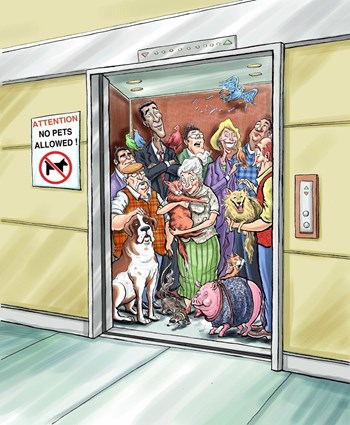
Board members and property managers have all experienced finger pointing, in which the accusation, “You let them do it, so I can too!” is front and center. Lawyers and property managers all too frequently see the trouble that results when a rule is bent for one owner and then other owners demand similar treatment.
Kenneth Sheppard is vice president of residential management at Foxfire Management Co. in Concord, New Hampshire, which oversees properties throughout the state. He hears regularly from frustrated board members who are in a pickle after ignoring a rule—or, worse, a bylaw—to do someone a favor. That pickle turns pretty sour once neighbors notice the inequity.
“I always preach that everyone is to be treated the same, whether it’s a board member or a board member’s neighbor or friend, so they don’t put themselves in a position where someone can come back and say ‘you did this’ or ‘you did that—why not me?’ And it’s the correct way to do it,” Sheppard says.
Bylaws, rules and regulations vary by association and location, but “they’re there to protect everyone’s best interest and the property values, and for the most part, everybody understands that.”
When board members cave in, they may run into trouble with others, who use it to divert attention from their own violation, citing a now-popular “precedent.” Rule-bending then becomes the inevitable monkey wrench thrown into discussions. “You have to bring them back to the current situation and focus on that,” Sheppard says.
Best practice: Don’t say yes immediately. “There was a policy in one of the associations we manage that people have to go through an application process prior to bringing a pet on the property, and a member of the board indicated to the prospective pet owner, ‘Just go ahead and get the pet and submit the paperwork after.’ The board president then found out about the policy and went back and told the individual that he had to follow the rules like everyone else.
“You’re trying to be nice to a neighbor, and not really thinking of the consequences. In the end, being a board member, you have to uphold the rules and regulations.” Once informed, Foxfire gives residents 48 to 72 hours to correct the violation. If they don’t, “We go back to the board, and ask them to do what’s deemed necessary to correct the problem. Most of the time, they (residents) will; they may not like it, but they’ll do it.”
In the Trenches
Angie Carter, board president of Mast Yard West in Concord, New Hampshire—managed by Sheppard’s firm—knows the tough spots.
“It’s pretty difficult when folks aren’t following the rules, and you call them on it,” she says. “Oftentimes, they will feel they’re being singled out. I don’t think they understand that other people are being held accountable as well … it’s like you’re picking on them. They’ll say, ‘You have a vendetta’ or something. They’ll make an appeal, want their fines dropped because, ‘Oh, we’ve never disobeyed the rules before; we should be exempt.’ The hardest situations come from off-site landlords who rent units and don’t supply tenants with the rules and regulations … they don’t have to deal with the repercussions of someone not obeying the rules. They’re passive about it.
“It’s important for an absentee landlord to follow the rules, and keep the property in a desirable place to live, to keep the value of their property up. A fine goes out to the owner of the unit, and it’s his responsibility to recoup his fine from his tenant.”
Fortunately, most people follow the rules. “It’s a few, chronic folks who feel the rules don’t apply to them. … Those are the ones the board ends up dealing with on a frequent basis,” Carter says.
Legal Repercussions
Laws differ, so consult a lawyer practicing in the same state—before making a bad decision.
First, know what you’re dealing with, says attorney Henry Goodman of Goodman, Shapiro & Lombardi, LLC, a Dedham, Massachusetts and Providence, Rhode Island firm. “There’s a misconception that there is something known as ‘precedent’,” he says. “That’s a term for courts and litigation. There are no precedents in condominiums. What there may be are doctrines.”
He encounters such things as waiver of the rules by failure to enforce, or selective enforcement, and invalid restrictions, located in the wrong place in condo documents.
“Many board members don’t know the differences required to change original doctrine—the “Master Deed” setting the condominium’s bylaws—from what’s needed to change rules and regulations. Nor do they realize the difference between setting new rules and regulations for a private residence, as opposed to common areas. But they are there,” Goodman says. Boards can amend rules and regulations, but only a majority of owners can change bylaws. When boards confuse the two in making decisions, there is sometimes legal hell to pay.
Restrictions on units and ownership rights have to be in the original bylaws, and can only be changed by majority vote.
“Some insurance companies are recommending that boards insert regulations in the rules and regulations that either alter the provisions of the bylaws, or add something more to the bylaws than is administrative.” Boards cannot do that. “I’ve seen many regulations that are invalid as a matter of law, but the boards don’t know it. Unit owners who see these things in the rules and regulations sometimes feel they’re bound by them, even though legally, they’re not. If they challenge it with the board, the rule may be deemed invalid.” There would be even more infighting if either side knew their rights; usually, he says, they don’t.
This stream of confusion leads to a tangle of unenforceable rules and regulations that may expose the board to lawsuits.
Inside, Outside
Attorney Frank Flynn of the law firm of Downing & Flynn in Boston, speaking from the perspective of Massachusetts law, stresses the difference between what’s inside a unit and what applies in common areas. “Any rules and regulations that are governing the use of the unit have to be in the bylaws. So some condominiums will have rules that are incorporated in the bylaws, and that’s absolutely necessary if it’s governing the use of the unit (for example, not operating a business there, dog ownership, etc.). The Master Deed has a document called a Trust, where the bylaws of the trust are set up.” Rules that are just passed, and not part of the bylaws governing use of the unit, aren’t effective.
Outside the unit, the law usually differs. “Rules and regulations that are not part of the bylaws can govern common areas,” Flynn says. “How you can change rules is governed by the Trust documents, but usually the common areas can be decided on by the trustees—though there are always exceptions.”
It’s typically OK for a board to do these on its own: disapprove barbecuing on a common area terrace, set dog control rules, limit alcoholic beverages by the pool, or set parking practices. But change is contentious. “Better if it’s there from Day One,” he says.
“I’ve had a lot of condominium associations come to me and say, ‘We want to do this, or that, regulate this activity.’ Whether it’s pets, rental units, whatever, I always ask for the condominium documents first.” If it‘s not in the bylaws, it can be subject to challenge. Boards err when they fail to realize that. Once owners approve a bylaws change, it can be recorded there, he says. “A majority percentage becomes a binding bylaw.”
Procedural Recommendations
Connecticut attorney Lisa Anderson of Bender, Anderson & Barba, PC, in Hamden, advises putting differences, politely, on condo stationery. Know the law, she reiterates.
“Rules are a lot of times superseded by federal laws. If the manager knows this (change) is ill-advised, he should stay away from it altogether. If it’s less clear, where the manager absolutely agrees with the board—say an individual is tying a dog outside and the rule is clear that it’s not permitted—the manager should send a letter to the unit owner and sign it, SYX Association by Joe Manager, its agent.” (Failure to take this step, she warns, can subject a manager to independent liability.)
“A lot of times they think there is something in their rules, and it doesn’t even exist—or worse, there are multiple copies of rules, generated at different times. It happens all the time, and it’s a prescription for disaster if they take any enforcement action.”
Next suggestion: Meet. “The board should be getting together an organizational meeting,” to periodically review all documents, from bylaws to rules, she says. Professionals should be consulted, as serious questions or conflicts occur that should be ironed out before the next issue erupts. “If the rule no longer makes sense, or isn’t viable, they should take measures to revise it. The rules are intended to be a document that meets the needs of the community … the board has its job, in my mind, to exert good leadership and to use good judgment.”
It’s not always a simple letter-and-fine process. Anderson says holding a good conversation after a violation is sometimes preferred (and a way to avoid litigation). “Often, violations occur when people first move in; they just don’t know or understand the rules. If the board gets off on the wrong foot with them, it really damages the relationship. The board has to enforce the rules that are on the books, legitimate and legal. But they can use judgment as to how they enforce them.”
She cites the example of a young man who had to drop out of college due to serious illness, and whose father died in the same period. “Those were tragic losses for that family,” Anderson says. When the young man wanted to resume college, he needed money, so he bought an ice cream truck as a summer business. The board didn’t want to further disturb the family, but the rule was there: no commercial vehicles in the lot. Anderson suggested creativity. “I advised they put parameters around the decision. Tell him he has to remove the vehicle on, or before, Aug. 31. That kind of solved everybody’s needs.”
“Don’t Be Rigid or Inflexible”
The notion of precedent is overdone, she believes. “No issue is always the same. Leadership is about judgment, good sense and concern for the bigger goals, like creating community. All you can expect is change. Don’t be rigid or inflexible.”
Reversing a poor decision requires caution. Boards may need to seek an agreement that someone won’t sue them once a change is made. Plus, no court looks kindly on a board reversing a decision that a prior board has made when it deeply impacts a resident, Anderson says. The board may have to tolerate pre-existing situations, or seek a compromise. Federal law may come into play, such as when a family needs a fence, despite the rules, to keep an autistic child in the yard rather than risk injury. “I’ll say, you’re gonna have to figure this out, or run afoul of the Fair Housing Act. You don’t have to go right into the courthouse!” Nor are other residents always keen on spending money for lawyers instead of negotiating. Or the reverse may be true. It’s a bag of legal jelly beans, just waiting to be shaken.
“I’m not a fan of having no rules,” she says, “but put your resources and effort into material issues…. Then enforce them. Resolve the dispute. … I’m a huge fan of mediation.”
Ann Connery Frantz is a freelance writer and a frequent contributor to New England Condominium.






Leave a Comment